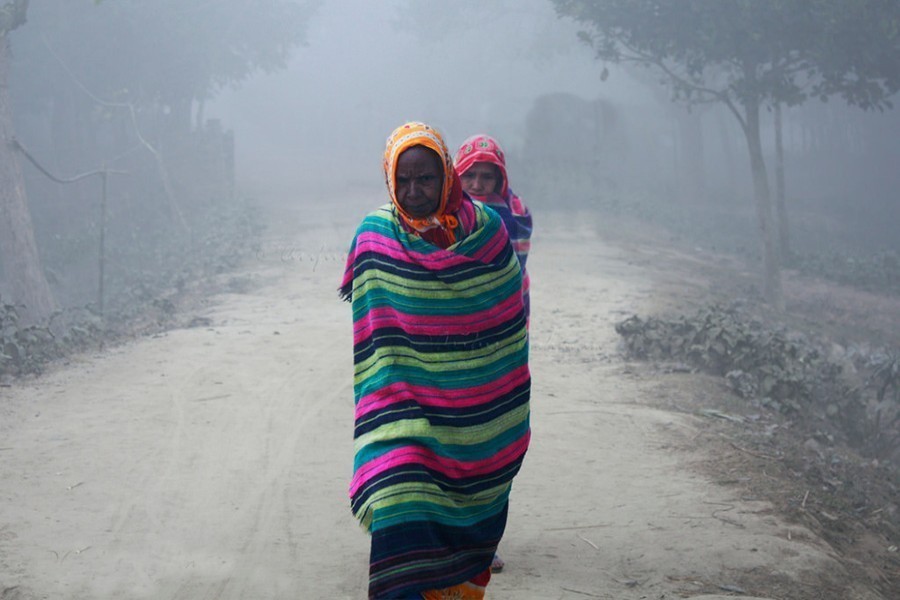
Published :
Updated :

Vast swaths of Bangladesh were shrouded in dense fog as another day passed without a speck of sunshine. Temperatures remained low throughout the country, with a cold wave sweeping eight districts.
The gap between the day and night temperatures shrank further, leaving people shivering in the cold. Day workers, in particular, have been affected by the dense fog, paired with chilly winds, as hospitals teem with patients suffering from cold, flu, and other winter illnesses.
Rajshahi, Pabna, Dinajpur, Panchagarh, Nilphamari, Jashore, Chuadanga, and Kushtia were gripped by a mild cold wave, which is likely to continue for the next few days, according to meteorologist Abdul Hamid Mia.
On Thursday, Jashore was the coldest district in the country, where the mercury dropped to 9 degrees Celsius at one point. Meanwhile, the lowest temperature in Dhaka was recorded at 12.5 degrees Celsius. The temperature across the country hovered around 9-16 degrees Celsius.
The highest temperature in the country was recorded at 28.2 degrees Celsius in Teknaf, according to bdnews24.com.
According to the Bangladesh Meteorological Department, an intense cold wave is said to occur when the temperature falls below 6 degrees Celsius over a vast area. If the mercury lies between 8-10 degrees Celsius, it amounts to a mild cold wave while a moderate cold wave is where the temperature ranges from 6-8 degrees Celsius.
“Nighttime temperatures across the country are likely to remain unchanged, while it may get a little warmer during the day. The northern, north-western and central regions of the country are experiencing moderate to intense cold weather as the difference between day and night temperatures shrank,” said meteorologist Hamid.
Cold weather has enveloped the country for the last few days, with rare instances of sunlight piercing through the thick fog cover during the day.
School-goers are bearing the brunt of the winter cold in the morning, while labourers and professionals are also donning thick clothes before heading out to work.
However, Omar Faruq, a construction worker, was an exception as he wore a thin tee shirt and lungi while working at a construction site in Mohammadpur.
“When I work, my body heats up and I don’t feel cold at all. I’ll feel the chill when I stop working,” he said.
Rickshaw driver Mohsin wore a long-sleeved T-shirt underneath a short-sleeved shirt when he went out to work in the morning. While he initially felt the sting of the cold winds, he soon began sweating as he paddled his rickshaw.
Zafar Ahmed and Shumi Akter brought their six-month-old child, who is suffering from pneumonia, to the Dhaka Shishu Hospital. The hospital authorities allowed Shumi to stay with the child, but not the father. Zafar had to spend the night outdoors in the garden outside the hospital.
Attendants are not allowed to stay in the corridors of Shishu Hospital. As many as 10 people were found lying on mats on the porch at the entrance. Others were seen lying on the floor in the corridors wrapped in blankets. Those who failed to find any room there ended up in the open garden or the balcony near the outdoor department.
“Winter is taking a toll on people and we can see an uptick in the number of patients. Many parents bring their children to the hospital after the illness intensifies and reaches its last phase. They must be more aware and bring children to the hospital as soon as they catch a cold and cough,” said Prof Md Jahangir Alam, director of the hospital.
The weather is likely to remain dry with partly cloudy skies across the country over the next 24 hours, according to the Met Office. Dense to moderate fog is expected to occur until the morning, and in some places, until midday.
As many as three cold waves are in the long-term forecast for January, one of which could be moderate, the Met Office said.


 For all latest news, follow The Financial Express Google News channel.
For all latest news, follow The Financial Express Google News channel.